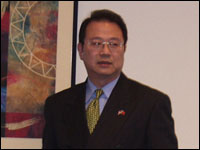{
"authors": [
"Alexander Huang",
"Michael D. Swaine"
],
"type": "event",
"centerAffiliationAll": "",
"centers": [
"Carnegie Endowment for International Peace"
],
"collections": [],
"englishNewsletterAll": "",
"nonEnglishNewsletterAll": "",
"primaryCenter": "Carnegie Endowment for International Peace",
"programAffiliation": "",
"programs": [
"Asia",
"Nuclear Policy"
],
"projects": [],
"regions": [
"East Asia",
"China",
"Taiwan"
],
"topics": [
"Security",
"Military",
"Foreign Policy",
"Nuclear Policy"
]
}
Security Through Procurement? The Debate Over Taiwan's Defense Spending
Thu, October 27th, 2005
Washington, D.C.
IMGXYZ424IMGZYXOn October 27, 2005, the Carnegie Endowment for International Peace hosted an off-the-record talk by Taiwanese security expert Dr. Alexander Chieh-cheng Huang. Carnegie Endowment Senior Associate Michael Swaine moderated the discussion.
Dr. Huang is Professor of Strategic Studies and Director of the Graduate Institute of American Studies at Tamkang University and Vice President of the Foundation on International and Cross-strait Studies in Taiwan. He is a Senior Associate at the International Security Program at the Center for Strategic and International Studies (CSIS). Dr. Huang has served in the Taiwan Government as Vice Chairman of the Mainland Affairs Council. His remarks are summarized below.
In April 2001, the Bush administration approved a package of arms sales to Taiwan. The Taiwanese responded in May 2004 by proposing a Special Budget to fund the purchase of PAC III anti-missile systems, P-3C long-range anti-submarine aircraft, and submarines. The Taiwanese now plan to fund the purchase of the PAC III systems through the Annual Budget. As of late October 2005, the Legislative Yuan Procedure Committee had rejected the Special Budget 34 times.
IMGXYZ423IMGZYXDr. Huang offered a political analysis of the reasons the two Pan-Blue parties, the Kuomintang (KMT) and the People First Party (PFP), oppose the Special Budget. Both the KMT and the PFP agree that Taiwan should strengthen its defense through arms procurement from the United States, but they believe that the Special Budget is an inappropriate way to purchase defense items. Faced with upcoming electoral changes that will decrease the number of seats held by smaller parties, the pan-Blue PFP and the pan-Green Taiwan Solidarity Union (TSU) are polarizing their differences in order to consolidate their support from their respective sympathizers. The existence of almost constant elections through 2020 will make resolution of this issue particularly difficult as politicians focus on their own elections and not on the substance of the problem.
Dr. Huang concluded that Taiwan should engage in a political dialogue with China, while enhancing its security links with the United States.
Carnegie's Michael Swaine responded:
Dr. Swaine argued that the Special Budget has become a symbolic issue in both the United States and Taiwan. U.S. policy-makers see approval of the Special Budget as a means by which the Taiwanese can prove that they are sufficiently committed to their own defense, while the Taiwanese see the Special Budget as “protection money” that Taiwan must pay to the United States in order to ensure continued positive relations between the two countries. The real problem Taiwan faces is its inability to develop a coherent defense strategy, given the lack of public agreement about the nature and significance of the threat from the mainland. If Taiwan folds the purchase of the items specified by the Special Budget into the Annual Budget and if the United States ceases to view the Special Budget as a litmus test of Taiwan’s commitment to its defense, Taiwan will be more likely to incrementally increase its defense spending and the controversy will be diffused.
Carnegie does not take institutional positions on public policy issues; the views represented herein are those of the author(s) and do not necessarily reflect the views of Carnegie, its staff, or its trustees.
